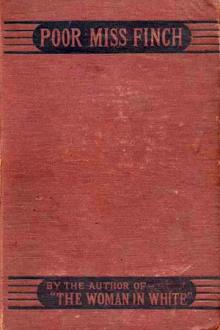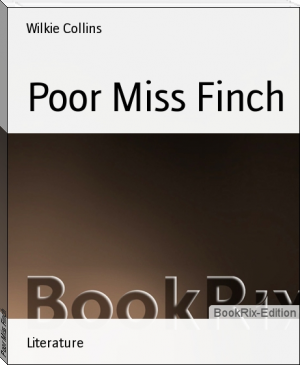Poor Miss Finch - Wilkie Collins (best books to read for beginners txt) 📗

- Author: Wilkie Collins
- Performer: -
Book online «Poor Miss Finch - Wilkie Collins (best books to read for beginners txt) 📗». Author Wilkie Collins
“Yes.”
She gently withdrew herself from me, and approached Nugent.
“Did you speak to me just now? Was it you who put the doubt into my mind, whether I am really doomed to be blind for life? Surely, I have not fancied it? Surely, you said the man was coming, and the time coming?” Her voice suddenly rose. “The man who may cure me! the time when I may see!”
“I said it, Lucilla. I meant it, Lucilla.”
“Oscar! Oscar!! Oscar!!!”
I stepped forward to lead her to him. Nugent touched me, and pointed to Oscar, as I took her hand. He was standing before the glass—with an expression of despair which I see again while I write these lines—he was standing close to the glass; looking in silence at the hideous reflection of his face. In sheer pity, I hesitated to take her to him. She stepped forward, and, stretching out her hand, touched his shoulder. The reflection of her charming face appeared behind his face in the glass. She raised herself on tiptoe, with both hands on him, and said, “The time is coming, my darling, when I may see You!”
With a cry of joy, she drew his face to her, and kissed him on the forehead. His head fell on his breast when she released it: he covered his face with his hands, and stifled, for the moment, all outward expression of the pang that wrung him. I drew her rapidly away, before her quick sensibilities had time to warn her that something was wrong. Even as it was, she resisted me. Even as it was, she asked suspiciously, “Why do you take me away from him?”
What excuse could I make? I was at my wits’ end.
She repeated the question. For once Fortune favored us. A timely knock at the door stopped her just as she was trying to release herself from me. “Somebody coming in,” I said. The servant entered, as I spoke, with a letter from the rectory.
OH, the welcome interruption! After the agitation that we had suffered, we all stood equally in need of some such relief as this. It was absolutely a luxury to fall back again into the commonplace daily routine of life. I asked to whom the letter was addressed? Nugent answered, “The letter is addressed to me; and the writer is Mr. Finch.”
Having read the letter, he turned to Lucilla.
“I sent a message to your father, asking him to join us here,” he said. “Mr. Finch writes back to say that his duties keep him at home, and to suggest that the rectory is the fitter place for the discussion of family matters. Have you any objection to return to the house? And do you mind going on first with Madame Pratolungo?”
Lucilla’s quick suspicion was instantly aroused.
“Why not with Oscar?” she asked.
“Your father’s note suggests to me,” replied Nugent, “that he is a little hurt at the short notice I gave him of our discussion here. I thought—if you and Madame Pratolungo went on first—that you might make our peace with the rector, and assure him that we meant no disrespect, before Oscar and I appeared. Don’t you think yourself you would make it easier for us, if you did that?”
Having contrived in this dexterous way to separate Oscar and Lucilla, and to gain time for composing and fortifying his brother before they met again, Nugent opened the door for us to go out. Lucilla and I left the twins together, in the modest little room which had witnessed a scene alike memorable to all of us for its interest at the time, and for the results which were to come of it in the future.
Half an hour later, we were all assembled at the rectory.
Our adjourned debate—excepting one small suggestion emanating from myself—was a debate which led to nothing. It may be truly described as resolving itself into the delivery of an Oration by Mr. Finch. Subject, the assertion of Mr. Finch’s dignity.
On this occasion (having matters of more importance on hand) I take the liberty of cutting the reverend gentleman’s speech by the pattern of the reverend gentleman’s stature. Short in figure, the rector shall be here, for the first time in his life, short in language too.
Reverend Finch rose, and said—he objected to everything. To receiving a message on a card instead of a proper note. To being expected to present himself at Browndown at a moment’s notice. To being the last person informed (instead of the first) of Mr. Nugent Dubourg’s exaggerated and absurd view of the case of his afflicted child. To the German surgeon, as being certainly a foreigner and a stranger, and possibly a quack. To the slur implied on British Surgery by bringing the foreigner to Dimchurch. To the expense involved in the same proceeding. Finally to the whole scope and object of Mr. Nugent Dubourg’s proposal, which had for its origin rebellion against the decrees of an all-wise Providence, and for its result the disturbance of his daughter’s mind—“under My influence, sir, a mind in a state of Christian resignation: under Your influence, a mind in a state of infidel revolt.” With those concluding remarks, the reverend gentleman sat down—and paused for a reply.
A remarkable result followed, which might be profitably permitted to take place in some other Parliaments. Nobody replied.
Mr. Nugent Dubourg rose—no! sat—and said, he declined to take any part in the proceedings. He was quite ready to wait, until the end justified the means which he proposed to employ. For the rest, his conscience was at ease; and he was entirely at Miss Finch’s service.
Mr. Oscar Dubourg, sitting hidden from notice behind his brother, followed his brother’s example. The decision in the matter under discussion rested with Miss Finch alone. He had no opinion of his own to offer on it.
Miss Finch herself, appealed to next:—Had but one reply to give. With all possible respect for her father, she ventured to think that neither he nor any one, possessing the sense of vision, could quite enter into her feelings as the circumstances then were. If there really was any chance of her recovering her sight, the least she could do would be to give that chance a fair trial. She entreated Mr. Nugent Dubourg not to lose one unnecessary moment in bringing the German surgeon to Dimchurch.
Mrs. Finch, called upon next. Spoke after some little delay, caused by the loss of her pocket-handkerchief. Would not presume to differ in opinion with her husband, whom she had never yet known to be otherwise than perfectly right about everything. But, if the German surgeon did come, and if Mr. Finch saw no objection to it, she would much like to consult him (gratis, if possible) on the subject of “baby’s eyes.” Mrs. Finch was proceeding to explain that there was happily nothing the matter, that she could see, with the infant’s eyes at that particular moment, and that she merely wished to take a skilled medical opinion, in the event of something happening on some future occasion—when she was called to order by Mr. Finch. The reverend gentleman, at the same time, appealed to Madame Pratolungo to close the debate by giving frank expression to her own opinion.
Madame Pratolungo, speaking in conclusion, remarked:—
That the question of consulting the German surgeon appeared (after what had fallen from Miss Finch) to be a question which had passed beyond the range of any expression of feeling on the part of other persons. That she proposed, accordingly, to look, beyond the consultation, at the results which might follow it. That, contemplating these possible results, she held very strong views of her own, and would proceed to give frank expression to them as follows. That in her opinion, the proposed investigation of the chances which might exist of restoring Miss Finch’s sight, involved consequences far too serious to be trusted to the decision of any one man, no matter how skillful or how famous he might be. That, in pursuance of this view, she begged to suggest (1) the association of an eminent English oculist with the eminent German oculist; (2) an examination of Miss Finch’s case by both the professional gentlemen, consulting on it together; and (3) a full statement of the opinions at which they might respectively arrive, to be laid before the meeting now assembled, and to become the subject of a renewed discussion before any decisive measures were taken.
Lastly, that this proposal be now submitted, in the form of a resolution, and forthwith (if necessary) put to the vote.
Resolution, as above, put to the vote.
Majority—Ayes.
Miss Finch. Mr. Nugent Dubourg. Mr. Oscar Dubourg. Madame Pratolungo.
Minority—Noes.
No (on the score of expense), Mr. Finch. No (because Mr. F. says No), Mrs. Finch.
Resolution carried by a majority of two. Debate adjourned to a day to be hereafter decided on.
By the first train the next morning, Nugent Dubourg started for London.
At luncheon, the same day, a telegram arrived, reporting his proceedings in the following terms:—
“I have seen my friend. He is at our service. He is also quite willing to consult with any English oculist whom we may choose. I am just off to find the man. Expect a second telegram later in the day.”
The second telegram reached us in the evening, and ran thus:—
“Everything is settled. The German oculist and the English oculist leave London with me, by the twelve-forty train tomorrow afternoon.”
After reading this telegram to Lucilla, I sent it to Oscar at Browndown. Judge for yourself how he slept, and how we slept, that night!
SEVERAL circumstances deserving to be mentioned here, took place in the early part of the day on which we expected the visit of the two oculists. I have all the will to relate them—but the capacity to do it completely fails me.
When I look back at that eventful morning, I recall a scene of confusion and suspense, the bare recollection of which seems to upset my mind again, even at this distance of time. Things and persons all blend distractedly one with another. I see the charming figure of my blind Lucilla, robed in rose-color and white, flitting hither and thither, in the house and out of the house—at one time mad with impatience for the arrival of the surgeons; at another, shuddering with apprehension of the coming ordeal, and the coming disappointment which might follow. A moment more—and, just as my mind has seized it, the fair figure melts and merges into the miserable apparition of Oscar; hovering and hesitating between Browndown and the rectory; painfully conscious of the new complications introduced into his position towards Lucilla by the new state of things; and yet not man enough, even yet, to seize the opportunity, and set himself right. Another moment passes, and a new figure—a little strutting consequential figure forces its way into the foreground, before I am ready for it. I hear a big voice booming in my ear, with big language to correspond. “No, Madame Pratolungo, nothing will induce me to sanction by my presence this insane medical consultation, this extravagant and profane attempt to reverse the decrees of an all-wise Providence by purely human means. My foot is down—I use the language of the people, observe, to impress it the more strongly on your mind—My FOOT is down!” Another moment yet, and Finch and Finch’s Foot disappear over my mental horizon just as my eye has caught them. Damp Mrs. Finch, and the baby whose everlasting programme is suction and sleep, take





Comments (0)